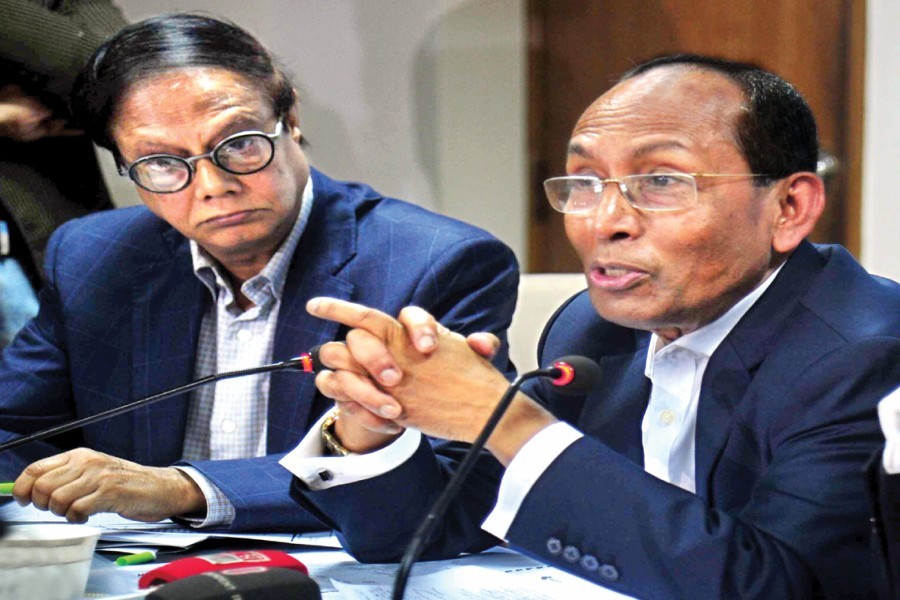Reform rules, cut corporate tax to 25pc to net in investment
PRI proposes package reform for investment climate, higher economic growth

Published :
Updated :

A national policy think-tank suggests Bangladesh knock down maximum corporate tax to 25 per cent over a three-year period as part of reform to spur investment and economic growth.
At the same time, the Policy Research Institute (PRI) called for simplifying and streamlining the tax laws and tax administration in line with 'good international practices'.
The points were made at 'Bangladesh Doing Business' roundtable held Saturday in the capital, Dhaka.
Experts at the event observed that despite a buoyant economy in run, private domestic and foreign investment is not showing the dynamism needed to accelerate the annual economic growth to 8.0 per cent.
"Our major competitors as India, Indonesia and Vietnam have made significant progress in the Ease of Doing Business rankings over the years while we are hardly making any improvement," said Dr. Sadiq Ahmed, Vice Chairman of the PRI, in his keynote presentation.
Analyzing the ease-of-doing-business indicators, the PRI researchers showed that Bangladesh ranking is at the lower end of countries for 9 of the 10 indicators.
The four indicators where Bangladesh performed relatively worse are: enforcing contract, registering property, getting electricity, and trading across borders.
"These suggest that there is no quick fix to Bangladesh's investment- climate challenges and it will require fundamental reforms over a long period," Mr. Sadiq told the meet.
Such views were also echoed by Kazi M Aminul Islam, Executive Chairman of Bangladesh Investment Development Authority (BIDA) who attended the event as chief guest.
"Currently, our laws are outdated, rules are unnecessary, processes are redundant, procedures are cumbersome, infrastructure is deficient, knowledge and skill level is behind many," said the BIDA boss.
"With this current status of infrastructure or regulations, we cannot go beyond 7.5 percent growth," Mr. Islam said, in reflection of his experience as chief investment-facilitator in the country.
He agreed with the policy analysts that reaching the next level of growth would require "massive reform".
Against this backdrop, as short-to-medium-term reforms, PRI researchers recommended lowering the maximum corporate-tax rate while also simplifying and streamlining the tax laws and tax administration.
Corporate-tax rates for non-listed companies in Bangladesh is currently 35 per cent and for the listed ones 25 per cent. Listed banks and insurance companies have to pay 40 per cent as corporate tax while listed banks and NBFIs 42.5 per cent. And on top of the tax pyramid are tobacco companies and non-listed mobile-phone companies paying at the highest rate of 45 per cent.
The PRI experts, however, called for lowering the maximum corporate tax to 25 per cent over a period of three years as part of a package reform aimed at boosting the country's investment climate.
They also called for simplifying and modernizing the foreign-currency regime while also emphasizing the need for reducing trade protection and lowering trade logistic costs.
"At the same time, the legal framework for contract enforcement and insolvency needs to be strengthened," said Mr. Sadiq.
As immediate measures, PRI researchers suggested establishing indicator-specific implementation committees, enacting the Companies Act reflecting the doing-business-indicator-specific recommendations and ensuring electricity connection to businesses within 28 working days.
They also called for introduction of e-filing and e-payment for all types of VAT and tax transactions and enforcing the mandatory mediation provisions in civil and commercial cases as well as loan-recovery cases.
President of Bangladesh Enterprise Institute Farooq Sobhan in his speech recollected that, a few years ago, South Korean giant Samsung wanted to set up a plant in Bangladesh but later relocated to Vietnam owing to various investment-related hassles.
"Now that same Samsung plant is exporting goods worth of US$ 60 billion each year from Vietnam," the former diplomat said to cite an epic case of disservice.
Reflecting on the recent government move to set up 100 Special Economic Zones across the country, President of the Metropolitan Chamber of Commerce and Industry (MCCI) Barrister Nihad Kabir said, "Instead of going for 100 SEZs at a time, we may initially look to set up 5 zones with a very high standard, get the lessons and then ramp up other 95."
Citing the example of India, former President of Bangladesh Garment Manufacturers and Exporters Association (BGMEA) Anwar-ul Alam Chowdhury called for establishing a Human Resource Ministry.
"This ministry should be tasked to analyze the future human-resource demands and to collaborate with the Ministry of Education for preparing the country's future generation as per that projected demand," the businessman said.
mehdi.finexpress@gmail.com


 For all latest news, follow The Financial Express Google News channel.
For all latest news, follow The Financial Express Google News channel.